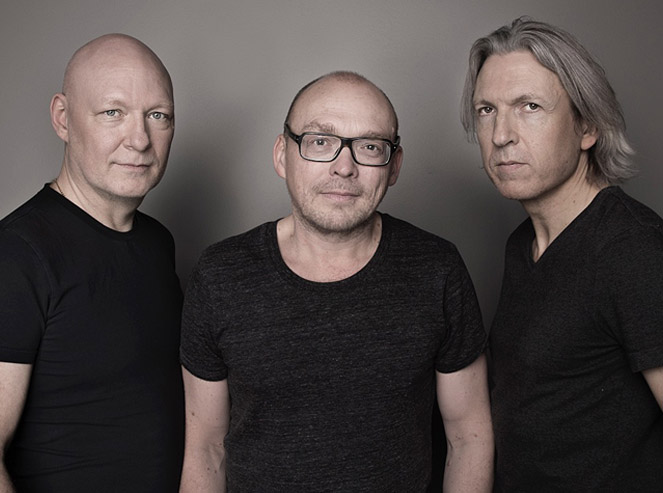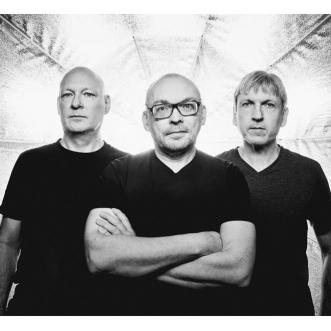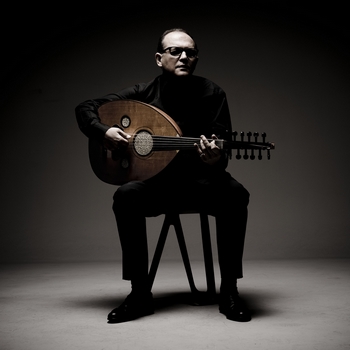jazz
Rymden

Présentation du spectacle
Bugge Wesseltoft + Dan Berglund + Magnus Öström = Rymden
LE nouveau super groupe de 3 esprits majeurs de l’histoire du jazz européen
Second album Space Sailors le 18 septembre 2020 disponible ICI
Jazzland / Pias
" Basses cataclysmiques, claviers futuristes et rythmes convulsifs y définissent un jazz de fer et de foudre à affoler tous les compas. " Télérama
" Higher, further, better "Jazz Thing (Allemagne)
"A genius mix " Stereo (Allemagne)
" Rymden lift-off with Space Sailors "Jazzwise (UK)
" Rymdens instrumental command and surging momentum make this album irresistible " Prog (UK)
" Sonically adventurous….The opener boast a heavy bass riff that Black Sabbath would be proud of " Record Collector (UK)
" How Led Zeppelin might have sounded had they evolved into a jazz combo…..Reimagining the art of the power trio " BBC Music Mag (UK)
Après « Reflections and Odysseys » en 2019, les scandinaves de Rymden lancent leur seconde mission « Space sailors », suite parfaite de ce premier disque hautement plébiscité et qui a donné naissance à une série de concerts qui l’étaient tout autant.
Le trio, dont la rythmique fût celle du mythique groupe E.S.T, a porté la dynamique, les textures, les humeurs et ce mélange parfait de détails subtils et de grands gestes sonores hissé à d’autres niveaux, collectant au passage de nouveaux éléments du psychédélisme et de l’énergie punk des années 60. Si vous vous êtes déjà demandé ce qui arriverait si une partition de Krzysztof Komeda adaptée à un film de Polanski entrait en collision avec le groupe de hardcore américain Fugazi, ne cherchez pas plus loin ; si vous voulez savoir comment sonnerait du Chopin composant du doom metal, vous pourriez avoir trouvé la réponse à votre question. Les éléments de rock progressif et de fusion que l’on connaît déjà sont toujours là, mais avec des couleurs et des tonalités différentes. Si "Reflections and Odysseys" était une première expédition en orbite terrestre, "Space sailors" va bien au-delà. Avec cet album, ils posent leur vaisseau sur la Lune.
Avec une palette sonore plus diversifiée, des claviers électroniques et des effets qui approfondissent le jeu, le trio pourrait se mettre en danger et devenir dépendant de ces ruses musicales. Elles sont au contraire la garniture parfaite de la recette de Rymden, un noyau de compositions riches en mélodies, avec des solos d’exploration profonde, des développements et de nouvelles imaginations de l’instant. Certaines miniatures d’une minute ou deux atteignent une grandeur épique ; et des morceaux plus longs entrainent dans des pérégrinations audacieuses avec des merveilles bigarrées à contempler en cours de route, ou des méditations prolongées sur un thème. Et bien que chaque membre ait sa part (presque parfaitement égale) de crédits comme compositeur, la signature globale est clairement celle de Rymden.
Leur nom signifie « espace » en suédois, ce que traduisent ces arrangements musicaux assimilés à des cartes interstellaires de ce cosmos harmonique. Le jeu trace des trajectoires et gravite autour de corps célestes de mélodies, de nébuleuses atmosphériques, de la chaleur torride des riffs de supernova en pleine explosion, et de la ceinture astéroïde dissonante.
Des marins de l’espace, en effet !
Comme pour « Reflections and Odysseys », les titres évoquent la vie de citoyen du monde à la fois habitant et voyageur, des moments de sérénité et d’introspection, avec un sens de l’humour dément et, bien sûr, la musique qui emboîte le pas.
Cette musique, qu’elle s’enlace autour d’un gigantesque riff martelé ou d’une tapisserie complexe de contrepoints délicats et de variations thématiques, est imprégnée d’une humanité chaleureuse, ouverte et généreuse.
Bien qu’aucune confirmation de leur statut de supergroupe ne soit requise, "Space sailors" l’affirme avec intelligence, humour, émerveillement, sérieux et joie, avec une énergie créatrice apparemment incontrôlable.
1er Album Reflections & Odysseys
8 février 2019
Jazzland / Pias
EP Live octobre 2019 en écoute ICI
The Odyssey
Deux formations emblématiques du jazz européen e.s.t. et New Conception of Jazz s’associent pour créer une nouvelle entité forte : Bugge Wesseltoft retrouve ainsi Magnus Öström et Dan Berglund (partenaires de feu Esbjörn Svensson) au sein du trio Rymden, pour un premier album à la personnalité forte, à la dynamique et l’énergie loin des clichés méditatifs / zen parfois faciles d’un jazz scandinave trop prévisible :
Une dynamique rugueuse, une technique de jeu complexe mais attractive, un son épique et cinématographique chargé en drama, en tension et en relâchement.
La musique de Rymden (espace en suédois) est portée par des mélodies fortes, des unissons chargés en combustible brut prêt à s’embraser, emplis de ce minimalisme dissimulé dans de riches tapisseries d’improvisation effrénée.
Une présence menaçante qui rôde, cachée dans ces manipulations électroniques subtiles d’un Wesseltoft, entre piano et Rhodes, tandis que Berglund et Öström explorent la quasi-totalité des sons possibles avec leurs instruments respectifs.
Bien que Bugge Wesseltoft ait souvent été présenté comme un musicien avec un véritable penchant pour les musiques en provenance d’horizons variés (cf. ses travaux avec Prins Thomas, récemment), il sait aussi apprécier lorsqu’une musique aux codes bien arrêtés se présente comme l’expression d’une identité profonde et singulière. En tant que véritable défenseur du “jazz européen en tant qu’art à part entière”, voici Bugge de retour au format trio jazz, épaulé par l’incontournable section rythmique suédoise composée de Magnus Öström et Dan Berglund, tous deux membres de feu le trio E.S.T. (Esbjorn Svensson Trio).
Les groupes New Conception of Jazz (dans lequel Bugge officie) et E.S.T. ont toujours eu des orbites différentes autour de la même planète; et ont contribué à produire quelques uns des albums et des concerts qui ont projeté la musique des années 90 dans le nouveau millénaire. L’influence des deux formations précitées s’est avérée profonde et peut toujours être ressentie aujourd’hui dans l’émergence de nouveaux talents de Scandinavie et d’ailleurs; la plupart d’entre eux ayant trouvé en Jazzland Recordings, le label de Bugge Wesseltoft, un îlot important pour développer leur musique et laisser éclore leurs projets respectifs.
Mais E.S.T. et New Conception Of Jazz ont toujours été avant tout des groupes d’explorateurs, d’expérimentateurs testant les limites des formes existantes tout en essayant de défricher de nouveaux territoires musicaux.
Que la rencontre entre ces deux collectifs incontournables du jazz européen du XXIème siècle finisse par se concrétiser n’est une surprise pour personne. Avec la création de Rymden (“espace” en suédois), c’est une musique résolument ancrée dans la culture scandinave dans son esprit et son attitude que nous voyons éclore devant nous.
























